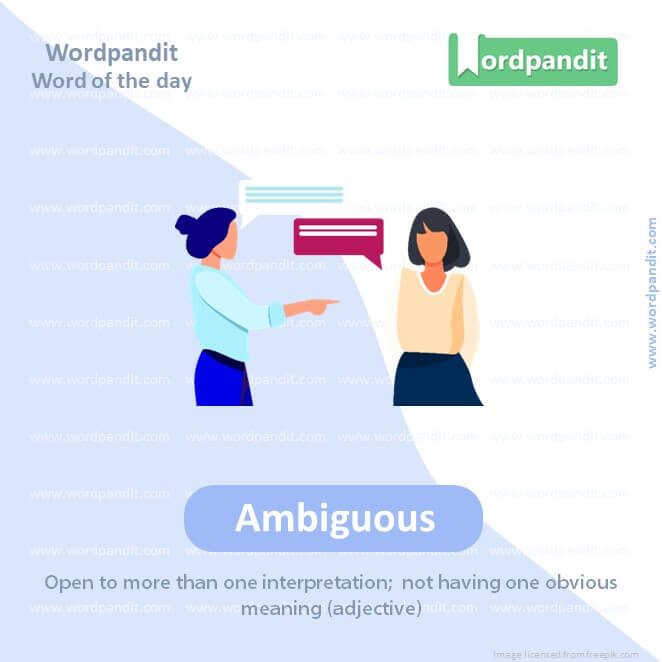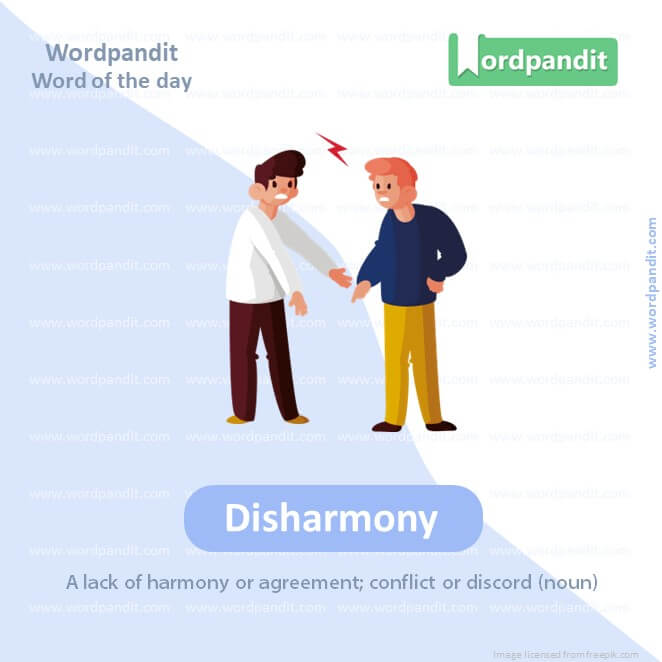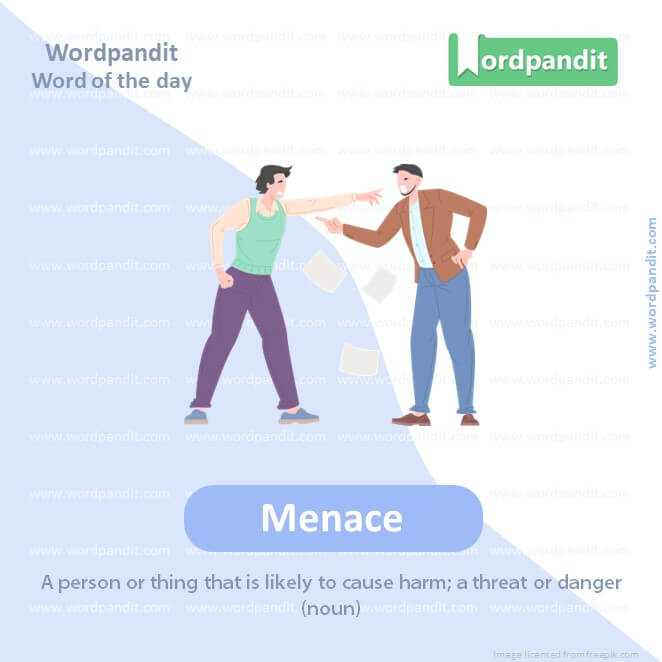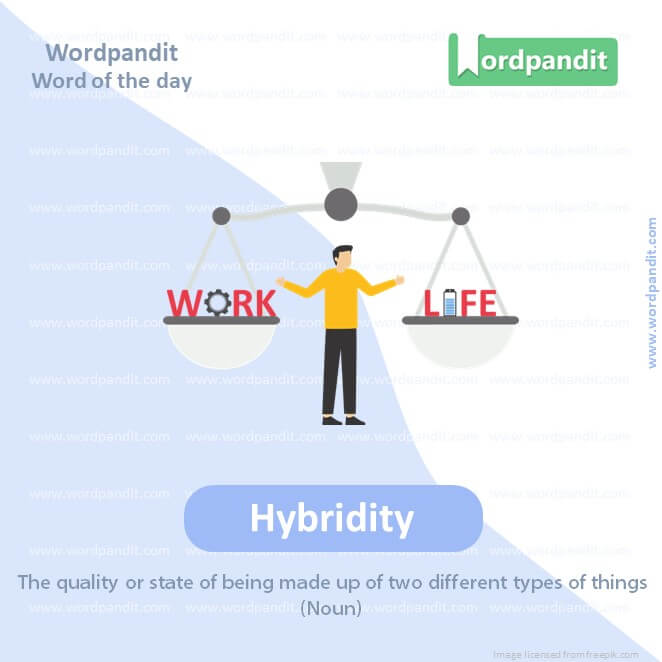Daily Vocabulary Words: List of Daily Used Words in Leading Indian Newspapers
Hi there. Welcome to this special section @ Wordpandit. Our endeavour here is straightforward: highlighting daily vocabulary words that you would come across in leading newspapers in the country. We have included the following newspapers in our selection:
• The Times of India
• The Economic Times
• Hindustan Times
• Mint
• Indian Express
We are putting in extensive work to develop your vocabulary. All you have to do is be regular with this section and check out this post daily. This is your repository of commonly used words; essentially, we are posting a list of daily used words. Hence, this has significant practical application as it teaches you words that are commonly used in leading publications mentioned above.
Visit the website daily to learn words from leading Indian newspapers.
WORD-1: Unified
CONTEXT: In favour of unified regulation for “broadcasting, OTT, Digital Media, DTH, IPTV”.
SOURCE: Indian express
EXPLANATORY PARAGRAPH: Think of a jigsaw puzzle. When you put all the pieces together, they become one big picture. That’s what “unified” means. It’s when different things or people come together and act as one. Like when you and your friends clean up a room together, you’re unified in doing the same thing.
MEANING: Characterized by or causing to become one; made whole or brought together as a single unit (adjective).
PRONUNCIATION: yoo-nuh-fahyd
SYNONYMS: Combined, Joined, Integrated, Merged, United, Consolidated, Cohesive.
USAGE EXAMPLES:
1. The two companies were unified into a single entity.
2. The team worked in a unified manner to achieve their goal.
3. The diverse group was unified by a common cause.
4. She sought a unified approach to solve the problem.

WORD-2: Ambiguous
CONTEXT: The broad and ambiguous framing of point 36 in the draft, which states, “Where any authorised officer, thinks it necessary or expedient so to do in the public interest
SOURCE: Hindustan times
EXPLANATORY PARAGRAPH: Imagine if someone drew a picture that looked like both a rabbit and a duck. You can’t tell which it is. That’s like “ambiguous.” It’s when something can have more than one meaning or it’s not clear what it means. Like if someone says, “I’ll see you later,” and you don’t know when ‘later’ is.
MEANING: Open to more than one interpretation; not having one obvious meaning (adjective).
PRONUNCIATION: am-big-yoo-us
SYNONYMS: Unclear, Vague, Indistinct, Doubtful, Obscure, Indeterminate, Equivocal.
USAGE EXAMPLES:
1. His response was ambiguous and confusing.
2. The ending of the story is intentionally ambiguous.
3. She gave an ambiguous answer to the question.
4. The instructions were ambiguous and hard to follow.

WORD-3: Disharmony
CONTEXT: It is likely to promote, on grounds of religion, race, language, caste or community or any other ground whatsoever, disharmony or feelings of enmity, hatred or ill-will between different religious
SOURCE: Times of india
EXPLANATORY PARAGRAPH: Imagine if everyone in a music band played different songs at the same time. It wouldn’t sound nice together, right? That’s what “disharmony” is. It’s when things or people don’t get along well and there’s a lack of agreement or feeling of being together.
MEANING: A lack of harmony or agreement; conflict or discord (noun).
PRONUNCIATION: dis-har-muh-nee
SYNONYMS: Conflict, Discord, Disagreement, Friction, Strife, Dissonance, Disaccord.
USAGE EXAMPLES:
1. There was disharmony among the team members.
2. The meeting was marked by disharmony and debate.
3. Disharmony in the band led to its breakup.
4. The disharmony between their opinions was evident.

WORD-4: Tranquillity
CONTEXT: Ill-will between different religious, racial, linguistic or regional groups or castes or communities or which is likely to disturb the public tranquillity.
SOURCE: Times of india
EXPLANATORY PARAGRAPH: Think about sitting quietly by a calm lake, watching the water and feeling peaceful. That’s “tranquillity.” It’s when everything is calm, peaceful, and quiet. Like when you’re cuddled up in bed, feeling all relaxed and comfy.
MEANING: The state of being calm, peaceful, and untroubled (noun).
PRONUNCIATION: trang-kwil-i-tee
SYNONYMS: Peacefulness, Calmness, Serenity, Quietness, Restfulness, Stillness, Repose.
USAGE EXAMPLES:
1. She found tranquillity in the quiet garden.
2. The spa was a haven of tranquillity.
3. He enjoyed the tranquillity of the early morning.
4. The painting captured a sense of tranquillity.

WORD-5: Menace
CONTEXT: The Cable Television Networks (Regulation) (hereafter, CTNR) Act, 1995, was introduced to curb the menace of illegal cable television networks and regulate the programming and advertising content on television.
SOURCE: Times of india
EXPLANATORY PARAGRAPH: Think of a big, growling dog that looks like it might bite. That dog is a “menace.” It’s when someone or something seems dangerous or threatening. Like when a big storm is coming, and it feels a bit scary because it can cause harm.
MEANING: A person or thing that is likely to cause harm; a threat or danger (noun).
PRONUNCIATION: men-is
SYNONYMS: Threat, Danger, Peril, Hazard, Risk, Nuisance, Scourge.
USAGE EXAMPLES:
1. The aggressive dog was a menace to the neighborhood.
2. He felt the storm was a looming menace.
3. Pollution is a menace to the environment.
4. The villain in the movie was a real menace.
WORD-6: Adhering
CONTEXT: two Doordarshan channels, besides adhering to content regulation.
SOURCE: Hindustan times
EXPLANATORY PARAGRAPH: Imagine you have a sticker, and you stick it on your notebook. The sticker sticks to the notebook and doesn’t fall off. That’s what “adhering” is like. It means sticking to something and not coming off.
MEANING: To stick firmly to a surface or object (Verb).
PRONUNCIATION: uh-HEER-ing
SYNONYMS: Sticking, Clinging, Attaching, Bonding, Affixing, Fastening, Holding
USAGE EXAMPLES:
1. The label was adhering to the jar tightly.
2. She is adhering to her study schedule very strictly.
3. The paint was not adhering well to the wet wall.
4. They are adhering to the traditions of their culture.

WORD-7: Hybridity
CONTEXT: the Indian television programming we witness today is a result of the hybridity of media languages (for example, Hinglish) and the adoption of foreign programming formats
SOURCE: Hindustan times
EXPLANATORY PARAGRAPH: Hybridity is like having a toy that is part car and part airplane. It’s a mix of two different things to make something new and interesting.
MEANING: The quality or state of being made up of two different types of things (Noun).
PRONUNCIATION: hahy-BRID-ih-tee
SYNONYMS: Mixture, Blend, Combination, Fusion, Mix, Integration, Amalgamation
USAGE EXAMPLES:
1. The garden displayed hybridity with plants from different countries.
2. Her music shows hybridity, combining jazz and classical styles.
3. The hybridity of the new car design was impressive.
4. The festival celebrated cultural hybridity.
WORD-8: Retransmit
CONTEXT: The operators were expected to transmit or retransmit programmes of any pay channel through set-top boxes offering the option of choosing television channels to consumers.
SOURCE: Indian express
EXPLANATORY PARAGRAPH: Retransmit is like when you tell your friend a story, and then your friend tells the same story to another person. It’s sending or telling something again.
MEANING: To send or broadcast something again (Verb).
PRONUNCIATION: ree-tranz-MIT
SYNONYMS: Rebroadcast, Resend, Relay, Repeat, Reproduce, Forward, Reissue
USAGE EXAMPLES:
1. The TV station will retransmit the show tomorrow.
2. The radio failed to retransmit the signal.
3. She will retransmit the email to her team.
4. The news was retransmitted across different channels.
WORD-9: Pervade
CONTEXT: The conflicts of interest that pervade the Indian media industries.
SOURCE: Indian express
EXPLANATORY PARAGRAPH: Pervade is like when the smell of cookies baking fills up the whole house. It means something spreads or goes through every part of something.
MEANING: To spread through and be noticeable in every part of something (Verb).
PRONUNCIATION: per-VADE
SYNONYMS: Permeate, Fill, Infuse, Saturate, Infiltrate, Imbue, Penetrate
USAGE EXAMPLES:
1. A sense of excitement pervaded the classroom.
2. The aroma of coffee pervaded the café.
3. Happiness pervaded the atmosphere at the party.
4. The novel is pervaded with a sense of nostalgia.
WORD-10: Legitimacy
CONTEXT: The legitimacy of these regulations and the reforms they promised to
bring.
SOURCE: Indian express
EXPLANATORY PARAGRAPH: Legitimacy is like when everyone agrees that the rules of a game are fair. It means something is accepted as right or proper.
MEANING: The quality of being acceptable, reasonable, or legal (Noun).
PRONUNCIATION: luh-JIT-ih-muh-see
SYNONYMS: Validity, Lawfulness, Authenticity, Rightfulness, Justification, Credibility, Validness
USAGE EXAMPLES:
1. The legitimacy of the new law was questioned.
2. He proved the legitimacy of his claim.
3. The election’s legitimacy was upheld.
4. They debated the legitimacy of the decision.
vocabulary new words with meaning and sentence
In the quest for effective communication and textual comprehension, gaining proficiency in ‘vocabulary new words with meaning and sentence’ is a vital step. This refers to the method of learning new words, understanding their meanings and context, and applying them in sentences. In expanding your lexicon, you become better equipped to express complex emotions and thoughts, to comprehend complicated narratives, and to engage in intellectual discourse.
The first aspect of learning ‘vocabulary new words with meaning and sentence’ involves seeking out and identifying new words. This can be done through reading widely, ranging from newspapers and novels to scientific journals and poetry. Listening to lectures and engaging in intellectual discussions can also be instrumental here. The goal is to expose oneself to a diverse range of vocabulary and dialects.
The second aspect to learning ‘vocabulary new words with meaning and sentence’ is understanding their meanings. This involves using dictionaries, digital tools, and context clues to gain a clear understanding of what each word signifies. In this phase, it’s essential to understand the layers of meanings a word might possess according to different contexts they are used in.
The final aspect of mastering ‘vocabulary new words with meaning and sentence’ is to apply them in sentences. By constructing sentences with new words, learners can understand their practical application. This not only solidifies their understanding but also helps to ingrain those words into their cognitive vocabulary-deck.
In conclusion, expanding ‘vocabulary new words with meaning and sentence’ can be a transformative approach to personal growth, knowledge enrichment, and effective communication. Therefore, approach this learning with curiosity and dedication, and you’ll be able to unlock new doors to understanding the world and expressing your thoughts.













